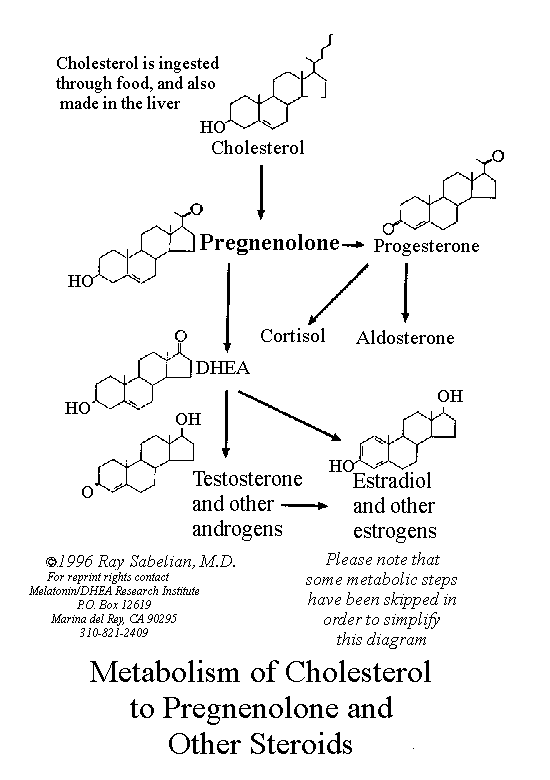What hormone --
Reduces stress
Provides a mild,
calm, pleasant feeling
Improves energy, mental outlook
and motivation
Increases mental acuity and awareness
Relieves arthritic aches and pains
Helps fight disease
Makes you feel younger and more vibrant
Pregnenolone (Preg for short) is a hormone that can improve
the quality of life of a large segment of the population, but
its potential has yet to be fully explored. Why is this?
Preg is a natural hormone which cannot be patented. Back
in the 1940's, when researchers started experimenting with
the use of Preg, they realized that it could be helpful for
people under stress and it could increase energy in those
who were fatigued. However, about the same time, cortisone,
another closely related hormone, was discovered. Cortisone
stole the limelight. When cortisone was given to individuals
with rheumatoid arthritis, there were outstanding short-term
improvements. Photographs of these remarkable recoveries
were circulated and the medical community was impressed.
Scientists basically put Preg aside to focus on cortisone.
The structure of cortisone was altered to make similar
molecules such as dexamethasone and prednisone, much more
powerful steroids. Dexamethasone and other similar
corticosteroids could be patented, and thus a pharmaceutical
company could make a lot of money by owning the patents.
Preg has stayed in relative obscurity since the 1940's,
with only rare mentions in the medical literature. A review
of Medline, the computer system that records all articles
published in scientific journals, shows only a few studies
published on Preg in 1995 and 1996, and only a couple
involve human subjects.
Since mid 1996, public attention
has slowly refocused on Preg. Why? Because Preg has become
more readily available to the consumer through mail order
vitamin firms, health food stores and even some drug and
retail stores. (The publication of DHEA: A Practical Guide,
a 30 page booklet, in July of 1996 also played a role in
heightening interest within the supplement industry.)
You may already know that melatonin, a hormone made
by the pineal gland, is sold without a prescription. So is
DHEA (dehydroepiandrosterone), a hormone made by the adrenal
glands. How is it that hormones are now available without a
prescription?
The Dietary Supplement Law
of 1994
In October, 1994, a law was passed by
Congress making it easier for companies and drug/vitamin
stores to sell any vitamin, mineral, herb, nutrient, amino
acid, food extract or any derivative of these supplements
without FDA approval. As you can see from the diagram Preg
is a derivative of cholesterol.

Cholesterol itself is derived from the foods we
eat, such as meats, eggs, poultry, butter, and dairy
products. Cholesterol is also produced by the body,
especially the liver. Therefore, even though Preg is
a steroid hormone, it is still considered a food derivative
and thus does not fall under the jurisdiction of the FDA.
The only certain way the FDA could pull this hormone off
the market would be if there were reports of serious side
effects. So far, there have been no serious
side effects reported with this steroid.
What is a Steroid?
A steroid is any
chemical substance with four carbon ring structures
attached to each other. Cortisol, DHEA, testosterone,
Preg, progesterone, and estrogen are all steroid hormones
that chemically look very similar to each other.
Structurally, they differ from each other in only small
ways. However, even tiny changes in the chemical make up
of a substance can make enormous differences in how it
functions and what role it plays in the chemical factories
of our bodies.